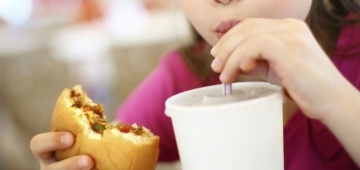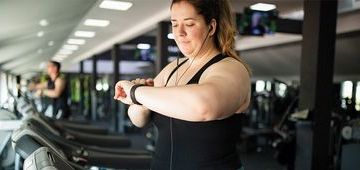Size Matters, a new report published by RSPH and Slimming World, exposes that the average person consumes an additional 330 calories each week – 17,000 per year – as a result of businesses upselling high calorie food and drink. Over the course of the year that could result in an estimated weight gain of 5lbs (2.3kg).
The report, which includes a survey of 2,055 UK adults, shows that consumers face an average of 106 verbal pushes towards unhealthy choices each year as they are asked whether they would like to upgrade to larger meals and drinks, add high calorie toppings or sides to their order or take advantage of special offers on unhealthy food and drink.
It reveals that, in the course of a week, upselling techniques used by businesses resulted in 34% of people buying a larger coffee than intended, 33% upgrading to a large meal in a fast food restaurant, 36% buying chocolate at the till at a newsagents or petrol station and 35% adding chips or onion rings to the side of their pub or restaurant meal.
The findings showed that young people are even more likely to be exposed to upselling, with 18-24 year-olds experiencing it 166 times each year – nearly every other day – and going on to consume an extra 750 calories per week as a result. This could lead to an estimated weight gain of 11lbs (5kg) over the course of a year.
RSPH and Slimming World want to empower people to insist that they get what they asked for, using the hashtag #JustThisThanks.
Shirley Cramer CBE, Chief Executive, RSPH said: "Almost everyone can relate to the feeling of being pressured into buying extra calories through upselling. Our latest report shows the extent to which these extra calories can really add up, often without us noticing. We hope that through this work the public can become more aware of how businesses target them with upselling and help people to maintain a healthy weight."
Sharon Hodgson MP, Shadow Public Health Minister said: "The promotion of unhealthy food has clearly infiltrated our society and is contributing significantly to the burgeoning obesity crisis we see today. Alongside the many actions to address obesity, it is crucial that consumers are empowered to make healthier choices at the checkout rather than being bombarded with junk food marketing or encouraged to upgrade to a larger drink or meal than the one originally ordered."
Commenting on the report findings, Caroline Cerny, Alliance Lead at the Obesity Health Alliance, said:"It's all too easy to eat more than we need when we are encouraged to buy larger sizes, add unhealthy extras or take advantage of special offers when it comes to unhealthy food and drink. There is clear evidence that marketing techniques persuade us to eat and drink more of the wrong types of food and this is driving the obesity epidemic. The food industry can play a vital role by helping to make healthier choices the easy choice and creating a healthier food environment for us all."
Jenny Caven, Slimming World Head of External Affairs, said: "It may seem that having a little extra or a larger bar of chocolate or bigger bag of crisps here and there won’t do much harm. The reality is that it all adds up – especially if you aren’t aware that many of these extra calories do little to satisfy your appetite or fill you up. This report shows that upselling is a real problem that is affecting people’s weight, health and confidence – as well as their wallets. And young people are more adversely affected than most."



